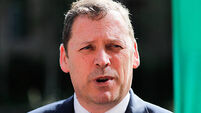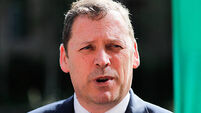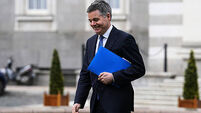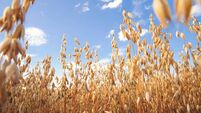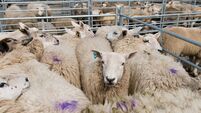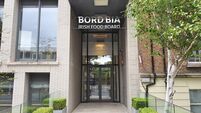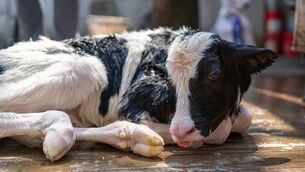Agri chiefs await Brexit as Europe fixes CAP

The two ministers had what Mr Creed described as a very positive pre-Christmas exchange of views in London as the situation relating to Brexit developed.
Meanwhile, the first in a series of All-Island civic dialogues to discuss the implications for the agri-food and fisheries sectors was hosted by Mr Creed in Gormans-town, Co Meath.
“A great deal of uncertainty remains as to the likely direction of events in relation to Brexit, but it is already clear that the challenge will be an enormous one,” he said.
Mr Creed announced that since the UK referendum on EU membership, cumulative additional resources of over €1.6m have been made available for Bord Bia programmes to support the Irish food and drink industry.
In particular, this was to assist companies to ease market volatility impacts, provide consumer and market insight, deepen customer engagement, extend market reach, and address marketing challenges.
As the Brexit debate intensifies, it is clear a lot is at stake for both countries — with CSO figures here showing that in 2015 the Republic exported almost €5.1bn worth of agricultural products to Britain while imports from the UK were worth €3.8bn.
The Economic and Social Research Institute (ESRI) had previously estimated that the potential reduction in bilateral trade flows could be as high as 20%, with an even higher impact on agriculture, food, and beverages.
And an analysis by Teagasc found that, depending on the assumptions made, the minimum impact could be a reduction of 1.4%, or €150m, per annum in the value of Irish agri-food exports, with a possible worst-case scenario involving a reduction of over 7%, or €800m, per annum.

Brexit also poses a serious situation for the fisheries sector. The UK is our second largest market for seafood after France but the most complex fisheries issues are those related to the possibility of restricted access to fishing grounds and resources.
Meanwhile, a report by the British House of Lords European Union committee recently called on the British government to pursue a special Brexit deal with Ireland.
The 80-page document, Brexit: UK-Irish relations, suggested that a special quota-based trade agreement might enable continued cross-border trade in agricultural produce between Ireland, Northern Ireland, and Britain.
Irish Farmers Association (IFA) president Joe Healy said it is important that access to the British market remains as free as possible, with the minimisation of any barriers to trade.
“The potential economic damage for the agri-food sector that would arise from a hard Brexit is too serious to ignore. Our first position is that the UK would remain a full member of the EU’s single market, including free trade on agricultural products,” he said.
Mr Healy said this is also the position represented by the National Farmers Union in the UK, with whom the IFA remains in regular contact and works closely in Brussels through the European farmers’ umbrella body, COPA.
Brexit is likely to be the dominant issue during 2017 as British Prime Minister Theresa May finally triggers the mechanism that will lead to her government negotiating Britain’s exit from the EU.
Mr Creed said he believes that, given the high levels of agri-food trade between Ireland and the UK and the highly integrated nature of that trade, it is in the interests of both to maintain the existing relationship to the maximum extent possible.
He said his meeting with Ms Leadsom provided a useful opportunity for him to emphasise the importance to Ireland of the potentially significant impacts for the agri-food and fisheries sectors arising from Brexit, and to assess UK thinking in this regard.
“It also allowed us to identify Brexit-related issues in respect of which we have a common interest. As such, I think it built very positively on the bilateral contacts that have already taken place at official level, and which we have agreed should continue over the coming months,” he said.
In the course of their discussions both ministers acknowledged the long tradition of trade in agri-food between the two countries, and agreed that they want this to continue.
Further afield, the value of Irish food and drink exports to France will need to increase by some 40%, to €1bn, if the industry targets in FoodWise 2025 are to be met.

That is the view of Bord Bia chief executive Aidan Cotter, who is due to retire. He will be succeeded by Tara McCarthy, currently the chief executive of Bord Iascaigh Mhara.
Mr Creed said Ms McCarthy will bring a wealth of domestic and international experience to the role at an important juncture in the agri-food industry during this period of challenge and transition.
The minister paid tribute to Mr Cotter’s leadership skills combined with his qualities of strength and leadership. These, Mr Creed said, have delivered excellence in Bord Bia market insight, quality and promotion services, and a close partnership with the agri-food sector in driving sustainable growth.
With uncertainty over the potential impact on Irish food and drink exports to Britain likely to continue for some time, other markets have taken on an added importance.
CSO trade data for the first nine months of 2016 have indicated renewed growth in Irish food and drink exports to France — Ireland’s third largest market in these sectors, behind Britain and the US.
These were up 4% in value and 6% in volume on the same period in 2015, respectively, driven by growth in the seafood, lamb, and beverages categories.
France continued to be Ireland’s largest eurozone export market for food and beverages in 2015, accounting for 6.6%, or €703m, of export revenue. France is Ireland’s most important customer for lamb and seafood, second largest customer for beef behind Britain, and the third largest export market for Irish whiskey globally.
Irish food’s visibility in the French foodservice sector was also enhanced recently by Bord Bia’s partnering with one of the leading restaurant guide books in France, Gault et Millau, to promote Irish meat to over 900 high-end French chefs in six different regions in 2017.
Noting that exports to France were valued at some €700m in 2015, Mr Cotter said it is vital that Bord Bia and exporters make the most of every opportunity to deliver growth.
Meanwhile, the European Commission has announced a roadmap to begin designing the Common Agricultural Policy of the future.
President Jean-Claude Juncker and commissioner Phil Hogan disclosed the move at a conference in Brussels. A wide-ranging public consultation will begin shortly with a view to publishing a document by the end of 2017.
It follows a commission commitment to “modernise and simplify” the CAP so that it makes a stronger contribution to job creation targets and sustainable development goals in the EU.
The CAP, which has an annual budget of roughly €59bn, allows the EU to protect 22m farmers and m jobs which depend on agriculture — twice the number of employees in the European auto and aviation sectors combined.
However, Mr Juncker said the CAP must be simplified to reduce the administrative burden on farmers. It must be modernised to meet the challenges of the 21st century and must meet the objectives in sustainable development, he said.
Mr Hogan said Mr Juncker’s announcement reflects a commitment to take forward work and consult widely.
“Without prejudicing the outcome, I believe that there are a small number of key principles that should inform this important work, which will affect the life of every European citizen,” said Mr Hogan.
“I am convinced, based on our market experiences as well as our international commitments, that the CAP has to ensure greater market resilience, more sustainable agricultural production; and progress on generational renewal.”
Mr Hogan said he had stressed at last year’s conference that the CAP needs to be “fit for purpose” to meet the challenges ahead.
Mr Hogan said while the last couple of years have been challenging, they have also shown that there are opportunities for European farmers and agri-businesses.
“Yes, the CAP makes great demands of our farmers when it comes to maintaining food safety and quality standards. We have the most stringent requirements of any agri-food system on the planet,” he said.
And that will not change. If anything, the expectations will only become greater. Put simply, the new CAP will have to have a higher level of environmental ambition. And that is because it is the right thing to do. Our farmers and related actors will have to focus on the challenge and innovate as never before.
But this challenge also provides huge and unquestionable opportunities for our producers.
Mr Hogan said the EU stands for high quality and high standards and this is a principle on which we should never waver. “There can be no question of joining any race to the bottom. Our standards are our reputation,” he said.
COPA and Cogeca, the umbrella bodies for European farmers and their co-ops, said a simpler, common, stable, and stronger CAP is needed to ensure a competitive, market-oriented EU agriculture sector.
Secretary general Pekka Pesonen said the EU agriculture and forest sector is vital to ensure quality food supplies as well as to maintain attractive and viable rural areas, growth, and jobs and to combat climate change.

